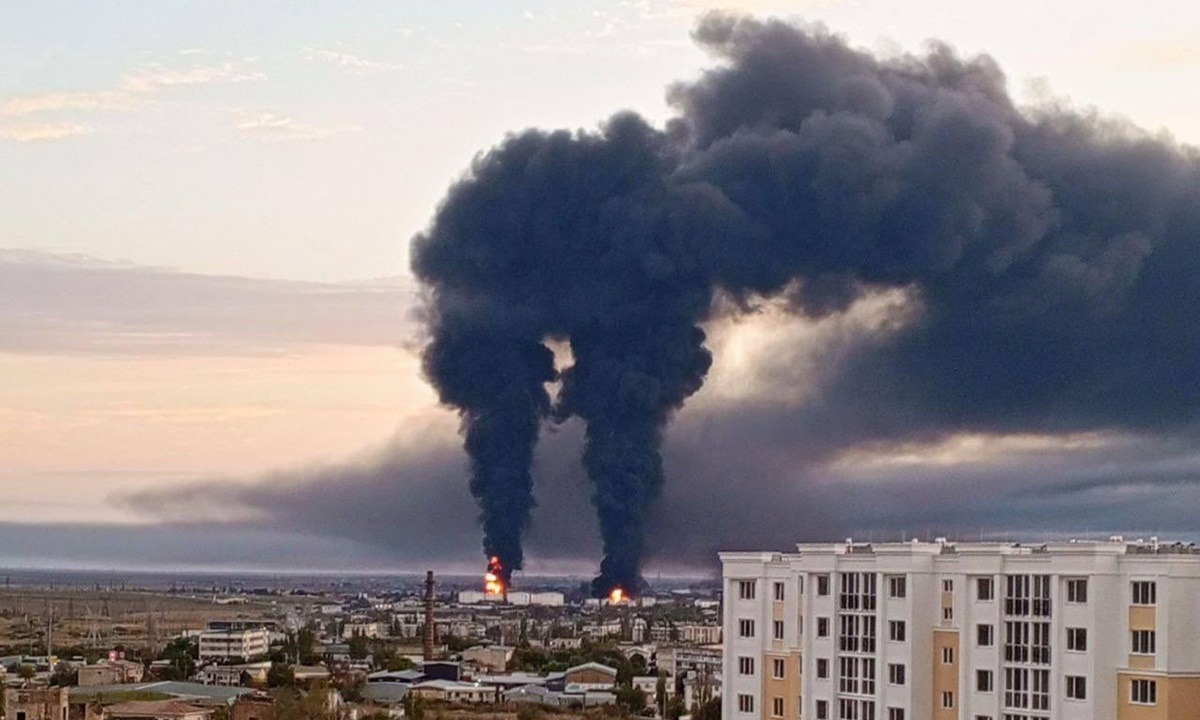For centuries, Russia's vast territory, the largest in the world, has been its greatest asset. It has made the country virtually unconquerable, ensured a seemingly endless supply of resources and manpower, and sustained its superpower status for generations.
However, there are signs this is changing since the war in Ukraine began. In recent months, the Ukrainian military has conducted a long-range strike campaign across Russia, exploiting Moscow's inability to defend its entire airspace.
 |
Fire rises from a Russian oil depot in Feodosia, Crimea, in 10/2024. Photo: X/Noelreports
Ukraine has used unmanned aerial vehicles (UAVs) to target Russian refineries since the early stages of the war, but the intensity of these attacks has increased significantly in the past month, causing growing damage. According to Reuters, by the end of August, Ukraine had disrupted at least 17% of Russia's refining capacity, while the Economist estimates the figure could be as high as 20%.
David Kirichenko, an expert at the Henry Jackson Society, a UK-based transatlantic foreign policy and national security research organization, believes Ukraine's campaign has triggered a fuel crisis in Russia.
In the Kurilsky district of the Kuril Islands, a shortage of A92 gasoline prompted local authorities to announce a halt to sales on 25/8. Some companies in Crimea are only selling fuel to those with coupons or special cards.
Wholesale prices for A95 gasoline on the St. Petersburg International Mercantile Exchange reached record highs in mid-August, up 50% from January, as demand surged due to farmers needing fuel for harvesting equipment and motorists embarking on summer road trips.
By early September, wholesale gasoline prices in Russia had climbed to record levels. The shortages and rising costs are creating social pressures the Kremlin cannot ignore.
"If Kyiv maintains the current intensity of attacks, they will likely begin to significantly limit the resources Russia uses to finance its campaign in Ukraine," Kirichenko said.
Russia relies heavily on oil and gas revenues to sustain its military operations and attract volunteers to fight in Ukraine. The Russian military needs a steady influx of personnel to overwhelm Ukrainian defenses, as assaults on fortified Ukrainian positions result in heavy casualties. To maintain troop numbers, Moscow offers high salaries and enlistment bonuses.
Disruptions to the oil and gas sector will not immediately cripple Russia's war economy but could force President Putin to make difficult decisions. Since the war began over three years ago, he has prioritized shielding the Russian population from the conflict's negative impacts.
If Ukraine continues its attacks on Russian oil infrastructure, the Kremlin may have to consider cutting spending in other areas to fund the military, potentially creating domestic instability, Kirichenko assesses.
An oil depot in Sochi, Russia, burns fiercely after a Ukrainian UAV attack on the morning of 3/8. Video: X/Exilenova_plus
Ukraine's ability to strike deep into Russian territory reflects its progress since 2022 in developing UAVs and long-range missiles. Early in the conflict, Ukraine had only a few UAVs capable of cross-border attacks. Now, Kyiv reportedly produces thousands of long-range UAVs monthly and recently unveiled several domestically produced cruise missile models with much larger warheads, significantly enhancing its air campaign.
The Ukrainian military is also learning and improving its tactics with each attack. Russian refineries and energy infrastructure are now constantly targeted, hindering repairs. Meanwhile, replacement parts often imported from the West are becoming increasingly scarce due to sanctions against Moscow.
Due to Russia's vast size, its current air defense network cannot cover every area, and Ukraine is fully exploiting this weakness, observers say.
Most of Russia's existing air defense systems are deployed along the front lines in Ukraine, leaving fewer systems to protect major cities and other high-value targets. By striking deeper into Russian territory, Kyiv is forcing Moscow to spread its air defenses more thinly, creating gaps that make some targets more vulnerable.
Even with significantly strengthened air defenses, Russia may still struggle to neutralize the threat of air attacks on its oil and gas facilities. With dozens of refineries, storage facilities, ports, and thousands of kilometers of pipelines spanning 11 time zones, fully protecting Russia's energy sector from attacks is an extremely difficult task.
Ukrainian officials understand that the current air campaign is unlikely to produce a decisive turning point in the war. However, they seem to be betting that as Russia's energy sector suffers increasing damage, at some point, President Putin will reconsider and engage in peace negotiations with Kyiv.
A fire reportedly at the Unecha pumping station in Bryansk Oblast, Russia, in a video released on 22/8. Video: Robert Brovdi
Many Ukrainians also believe that enhanced long-range strike capabilities are crucial to deterring a future Russian attack if a peace agreement is signed.
"Russia's vast size makes it a formidable opponent, but this scale also makes it vulnerable to counterattacks by a smaller adversary with a weapons arsenal tailored for such strikes," Kirichenko commented.
Vu Hoang (According to AFP, Reuters, Atlantic Council)












